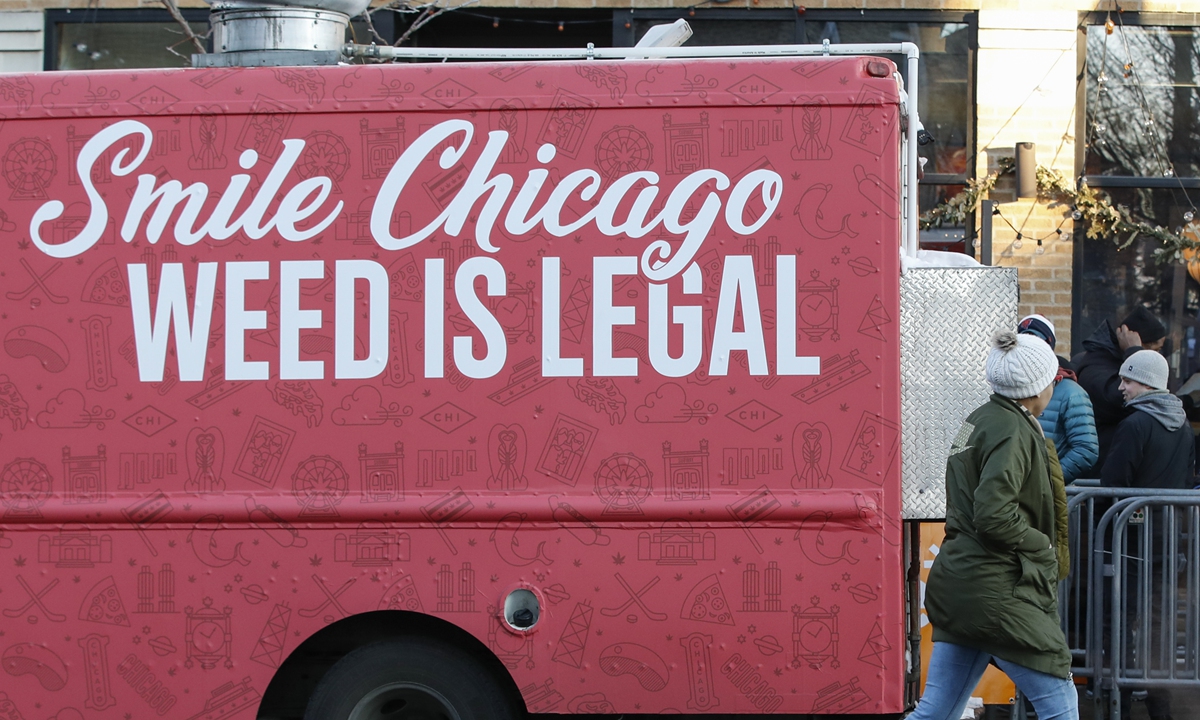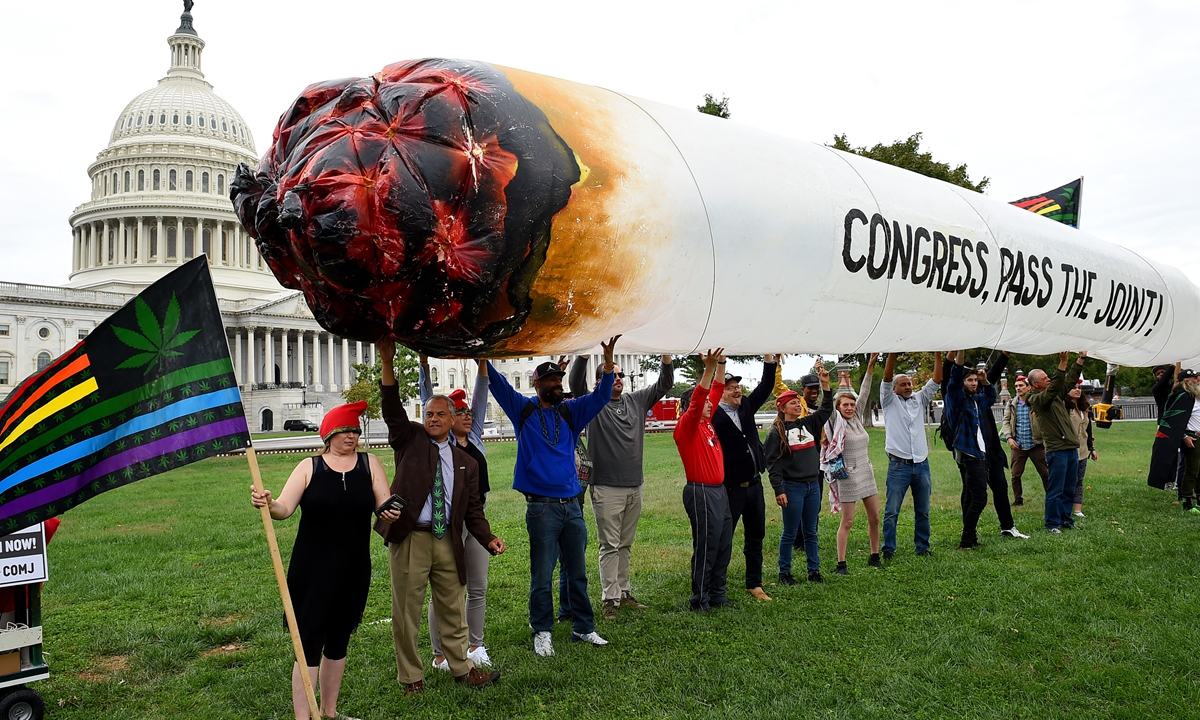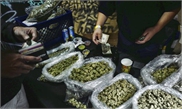IN-DEPTH / IN-DEPTH
Legalization of marijuana, prostitution: How Western countries maintain social stability with ‘tittytainment’
Escaping reality

A food truck sits outside the Sunnyside Cannabis Dispensary in Chicago on January 1. Photo: AFP
The US House of Representatives approved decriminalizing marijuana at the federal level for the first time in December, the deadliest month for COVID-19 patients since the virus outbreak. While there is, unfortunately, no end in sight to the pandemic, the legalization of marijuana is definitely in sight - the US is rushing to put it on schedule, particularly after Joe Biden's election as president.
Four more US states announced in November to legalize cannabis for adults aged 21 and older, adding the total number of US states that allow for adult-use consumption or retail sale of cannabis to 15. More states including New York and Connecticut are reportedly likely to turn green this year, when the pandemic in the US may still be continuing.
Although there is no direct link between the COVID-19 pandemic and the marijuana legalization, many observers point out that this narcotic drug has long been a tool that authorities in some Western countries including the US use to maintain superficial stability in the society.
Legalizing marijuana is a "Western-style stabilization" measure, akin to legalization of prostitution and guns. It aims to ease social tensions and even increase government revenue by legitimizing problems that cannot be solved, especially during the pandemic, Wang Yiwei, director of the Institute of International Affairs at the Renmin University of China, told the Global Times.
Marijuana amid pandemic
The pungent smell of burning marijuana became more intense amid the COVID-19 pandemic everywhere from public parks and subway stations to the dorm hallways on campuses, said Malcolm Burrell, a San Francisco resident.
Many Americans seem to have turned to marijuana to relieve the pains that the ongoing pandemic has brought. The average sales of cannabis products in adult-use markets have increased by 25 percent this year, according to research by cannabis analytics company Headset.
Dutchie, a company that helps cannabis dispensaries facilitate online orders, has even seen a 700 percent surge in sales volume during the pandemic, Geek Wire reported in August 2020.
"Perhaps the pandemic made more people lose hope in their lives," Burrell sighed. His home state California was among the first to legalize medical and recreational use of marijuana.
According to Burrell, there are a large number of legal marijuana shops in California, which remained open even during the pandemic lockdown. During the holidays, on San Francisco's main roads, police are often on the lookout for drug drivers, and drug addicts being killed in car accidents due to overdose of marijuana "is nothing new on local news sites," Burrell told the Global Times.
In San Francisco, local authority isolated some homeless people in rooms and provided them with methadone, alcohol and cannabis to prevent the coronavirus from spreading, the San Francisco Chronicle reported in May 2020. This controversial measure had caused heated debate in American society.
Coupled with the spread of the pandemic, racial conflict, wealth gap and social conflicts have torn the American society apart. The question of whether the poor in the US can afford the vaccine is also increasing the social anxiety. The safety, health and psychological problems caused by these ills are remedied by the legalization of marijuana, which is how the US government faces its failure to control the pandemic and raise its revenues, Wang noted.
"More state senators and representatives are intrigued by the potential showy financial results that marijuana legalization could bring," Burrell said, who claims to be a staunch opponent of marijuana legalization. "Once the Pandora's box is opened, it will bring untold suffering to people."

Activists from the DC Marijuana Justice (DCJM) hold a giant marijuana joint to demand Congress to pass cannabis reform legislation on the East Lawn of the US Capitol in Washington, DC on October 8, 2019. Photo: AFP
Serious damage
After extensive use of marijuana, there may be toxic reaction, including higher pulse rate, lower blood pressure, tremor, anxiety, depression, and panic. Users even assault others and harm themselves, and have persecutory delusions, confusion, auditory hallucination, and illusion, Lei Xiaozheng, a professor with the Law School of Beijing Normal University, told the Global Times.
Long-term and high-dose use of marijuana can cause some brain diseases, severe behavioral damage, immune system suppression and neurological diseases, impairing people's cognitive functions and their ability to accurately judge the length of time and space distance, and affecting their ability to drive, work and learn, Lei noted.
Marijuana may also destroy one's personal development at school or work. Studies showed that adolescents who used marijuana regularly were "significantly less likely than their non-using peers to finish high school or obtain a degree," according to a report published by the US National Institute on Drug Abuse (NIDA) in July 2020.
Another study among postal workers found that employees who tested positive for marijuana "had 55 percent more industrial accidents, 85 percent more injuries and 75 percent greater absenteeism" compared with those who tested negative, read the NIDA report.
Kristin Potter, a Dutch scriptwriter with a three-year history of drug abuse, decided to get rid of marijuana in 2020, a year when many people obtained "nothing but anxiety" amid the pandemic.
Potter recalled that when she was fully exposed to marijuana, her psychological resistance was constantly being breached, and she even wanted to look for new, more stimulating hallucinogenic drugs.
"But my body issued a warning," she said. "After experiencing severe memory loss, headaches and anxiety, I realized that I needed to block the bridge to the drugs before I plunged deeper into the abyss."
Marijuana also brings uncertain dangers especially to females. Potter said she has seen many paralyzed girls at the pub being taken away by some ill-disposed men they didn't know.
Some Western politicians argue that marijuana is less harmful than cigarette. But Lei thinks the two simply can't be compared.
"In some people's minds, a little marijuana is not as harmful or as being addicted to tobacco or alcohol. However, hallucinogenic loss of control and long-term psychological effects of using marijuana all lead to more specific dangers," he told the Global Times.
'Tittytainment'
The indulgence in marijuana as well as other social problems including prostitution, gambling and guns, reflects some Western countries' lack of social governance capacity, and their compromise to or collusion with stakeholders in these high-profit industries, said Chinese scholars of international studies.
Legitimizing the negative aspects of human society reflects a decline in the country's overall moral standards, Li Haidong, a professor at the Institute of International Relations of the China Foreign Affairs University, told the Global Times.
The legitimization is also a manifestation of the government's lack of responsibility in governing the country. It shows that some US states are unable to deal with social problems, and they cover up such problems instead of trying to solve them. This cover-up will eventually lead to more serious social conflicts with irreparable damage, Li noted.
Such "tittytainment" policy paralyzes people and masks problems, he said.
This "tittytaiment" logic is particularly apparent during the pandemic, as many Western governments and companies have reportedly offered more support to local entertainment industries, indirectly encouraging a befuddled, "happy-go-lucky" lifestyle amid the coronavirus chaos.
Several US states temporarily relaxed laws on alcohol purchases during the pandemic, The Hill reported in April 2020. In Canada, only days after closing local cannabis retail stores amid the pandemic, the Ontario government passed an emergency order that temporarily allowed the stores to "offer delivery and curbside pickup services," reported Global News in the same month.
"In September, when the 'coffee shops' and bars in Amsterdam's red light district reopened, I received numerous invitations from my friends," Potter recalled. "I could feel their excitement over the phone."
In The Netherlands, the term "coffee shop" sometimes refers to venues where cannabis (weed, hash, marijuana) are sold and consumed.
Unfortunately, numerous facts have proved that the Western way of maintaining social stability and alleviating social pains - by simply legalizing or decriminalizing some long-existing social problems - can hardly solve these problems fundamentally, and instead, may even intensify social conflicts.
The policy of legalizing marijuana, guns and prostitution for the sake of stability is a palliative. Instead of putting the interests of the people at the center of national development, a national policy that puts capitalist development at the center only masks problems and may even make them worse, Wang Yiwei said.
Human trafficking and sexual abuse have occurred at times in the decades since The Netherlands legalized prostitution. As a main destination of human trafficking victims in the Europe, about 58 percent of the presumed victims in The Netherlands were trafficked for the purpose of sexual exploitation, and nearly half of them were aged under 23, showed European Commission's website.
In the US, problems such as black market transaction, drug-driving car accidents and drug-induced violence have grown in recent years along with its marijuana legalization process.
At Burrell's college, although the orientation of freshmen emphasizes staying away from drugs, many students get addicted to marijuana. Worse still, a few of them obtain it from local gangs, he said.
"Some of my friends often joke about gun robbery or fraud to obtain drugs when they borrow money from me," Burrell said. "I am afraid that one day this nightmare can come true."

